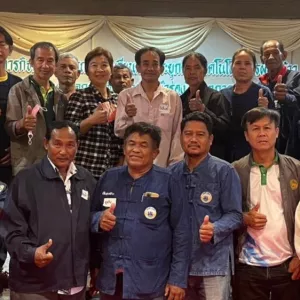Lessons learned from four low-emission technologies implemented by Thai Rice NAMA Project
The International Rice Research Institute (IRRI) recently held a workshop to share the data gathered and lessons learned from the implementation of low-emission rice cultivation technologies in Thailand’s CAPSAS provinces (Chai Nat, Ayuthaya, Pathum Thani, Suphan Buri, Ang Thong, and Sing Buri). The activity was organized under the Thai Rice NAMA Project , a Thai-German public-private initiative that aims to

Lessons learned from four low-emission technologies implemented by Thai Rice NAMA Project
The International Rice Research Institute (IRRI) recently held a workshop to share the data gathered and lessons learned from the implementation of low-emission rice cultivation technologies in Thailand’s CAPSAS provinces (Chai Nat, Ayuthaya, Pathum Thani, Suphan Buri, Ang Thong, and Sing Buri). The activity was organized under the Thai Rice NAMA Project , a Thai-German public-private initiative that aims to empower a shift toward low-emission rice production in Thailand by enabling farmers, supporting mitigation services, and formulating climate-sensitive policy at a national level.
The 2-day activity, held on 23-24 January 2024 in Suphan Buri, Thailand, was attended by various participants from the CAPSAS target regions. Day 1 was attended by representative agricultural officers from the Thailand Rice Department, Department of Agricultural Extension, Land and Development Department, and Royal Irrigation Department, while Day 2 was attended by representative farmers and local service providers.
Thailand is the world’s fourth-largest emitter of rice-related greenhouse gases, particularly methane (CH4) in irrigated environments. Rice is cultivated on roughly half of all agricultural land in the country and accounts for nearly 55% of emissions from agriculture.
The four low-emission technologies represent best practices by the project to improve rice yield and mitigate greenhouse gas emissions effectively. Namely, these are Laser Land Leveling (LLL); Alternate Wetting and Drying (AWD); Site-Specific Nutrient Management (SSNM); and Rice Straw and Stubble Management (RSM).
Some of the lessons learned that were shared and discussed during the meeting include:
The project raised rice farmers’ awareness of how climate change effects, such as water scarcity, drought, air pollution, and other surrounding environments, can impact their rice cultivation, with consequences such as pest infestations, lower yields, need for higher amount of fertilizer application, etc. Rice farmers’ positive attitudes towards the project goals affected the adoption of low-emission…

